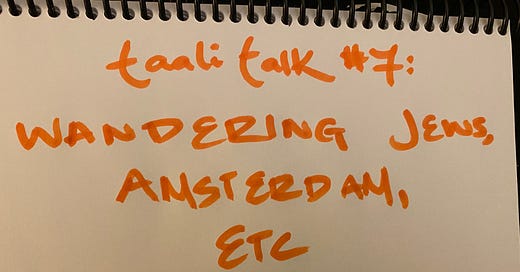Wandering Jews, Amsterdam, etc
I don’t know if I can remember exactly how we decided to get the fuck out of America. It all blurs more or less into itself, as 2020 often does.
A lot of you have asked about it, though, and it’s 9:27 pm on Sunday and I think I can tell you in a sort of freeform stream of consciousness for t-talk #7.
(So let’s get into it, shall we?)
When was it?
Was it day 50 of fever, the day I called my best friend and wondered if I’d just stay sick my entire life?
No, I know it wasn’t then, because when we were that sick in March I couldn’t drum up one coherent thought to save my life.
Was it the day John Prine died?
No, I know it wasn’t then, because that day in April I didn’t get out of bed. I just wept tears of fury at the preventable extinguishing of his perfect light and really thought about a whiskey for the first time in my 7 years of sobriety.
(We’re good, don’t worry.)
Was it the day in June when José and I lay on our living room floor and stared at the ceiling for hours without saying a word, buoyed by each other’s presence while otherwise completely, utterly unmoored?
I don’t know. I can’t pinpoint the moment. But I know that around July, when it became clear that there was no relief for the arts, no temp job for me to grab and no end in sight, I resolutely set my mind on getting us out.
The initial plan was to settle in Seoul. José had shows in Asia still on the books for October, and we figured we could wait it out there.
“Wait it out there.” I typed that just now and sighed to myself. Ah, to be Talia in July again.
The virus forged on. I watched the plan of our move to Amsterdam crystallize in real time. I was there and not there at every step of this thorough secret planning. We’d get on calls with the head of the Conservatorium van Amsterdam and I’d imagine a life outside of our living room. The ability to play a show again, even if only for 50 people. Planes. Trains. The stuff that keeps me going.
I come from a long line of this, after all. My people are jokingly named for our wandering. In my career, I’ve found a way to feed my inherited propensity for motion without being a victim of it.
Not today, though. One week from today we’ll be in the air, and I finally understand why my ancestors left their families, their homes and their lives behind.
My paternal grandfather applied for a visa to leave Nazi Berlin the morning he saw a Jewish man being dragged down the street by his beard. He fled to Palestine in 1934, his family mocking his nebbish-y anxieties all the way to the train station. Not one of them survived what was to come. It’s the stuff of myth in my home.
I’m writing from the home I grew up in now, about to flee myself. Our dear friend Keyon and his son were just horrifically racially profiled at a hotel. The footage has gone viral. We’re furious and also met with that paralyzing reality: That we’re deeply grateful they’re alive. The man in our story has been dragged by his beard, over and over and over again.
It’s time, my heart is telling me.
And it isn’t. I’m sitting by a fireplace with José and my parents. My mom is adorably reading recipes out loud to all of us from an Ottolenghi cookbook.
And it is. There are 333,000 deaths hanging over us. The number will grow tomorrow. Every single one of our friends is a month or so away from devastation.
It’s time.
I’m excited to meet these songwriters at the Conservatory. I’m unbearably excited to think about art and get to work again. I’m proud of us for putting in the time attempting to build a much needed bridge between our beleaguered country and the arts in Europe. And I also feel a real deep guilt about leaving.
I’m sorry I kept this secret from you for so long, but after this year, I wanted to make sure that that visa was in my fracking passport before I in any way jinxed it.
It’s time, and I love you. More next week.
t




